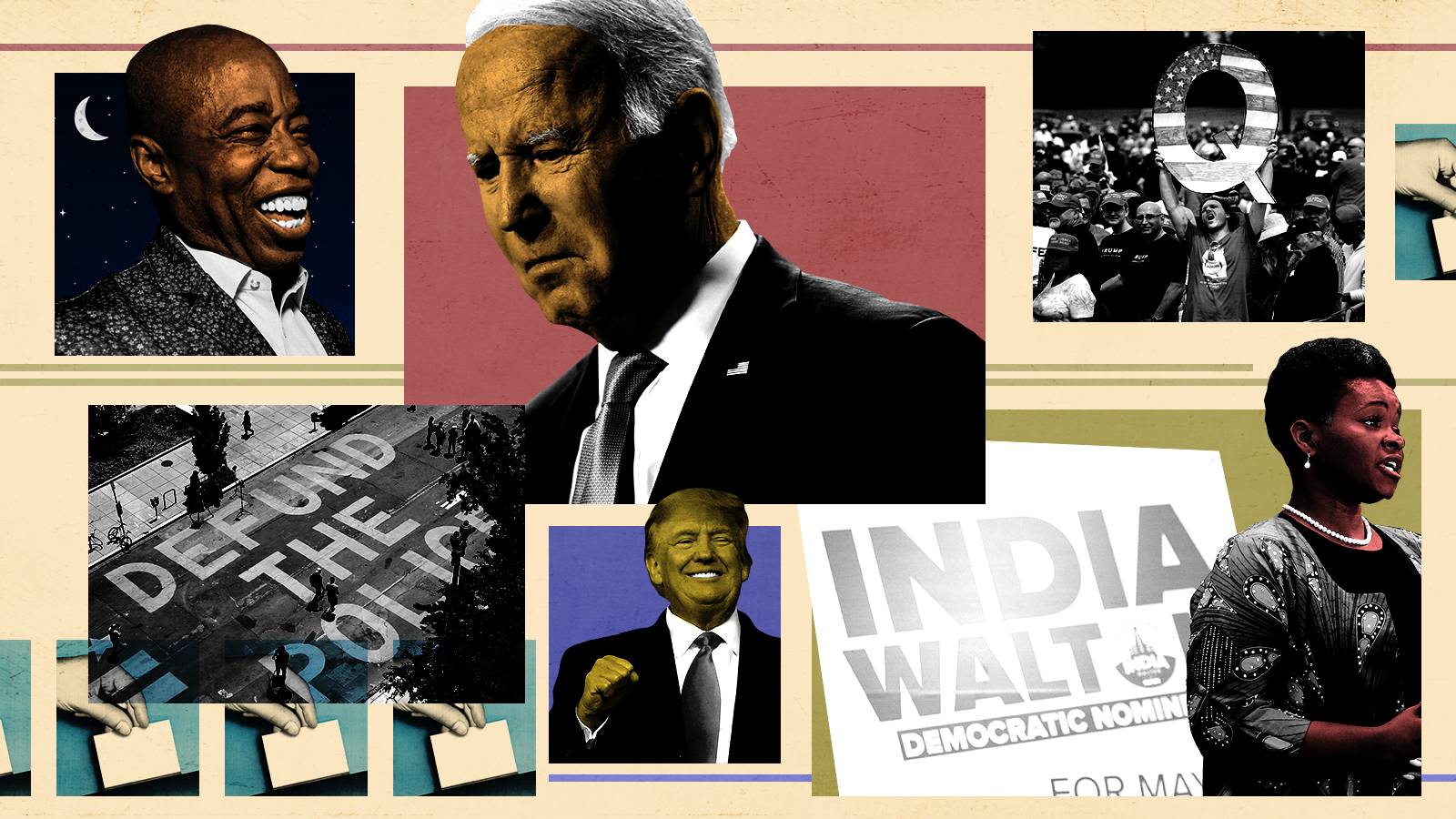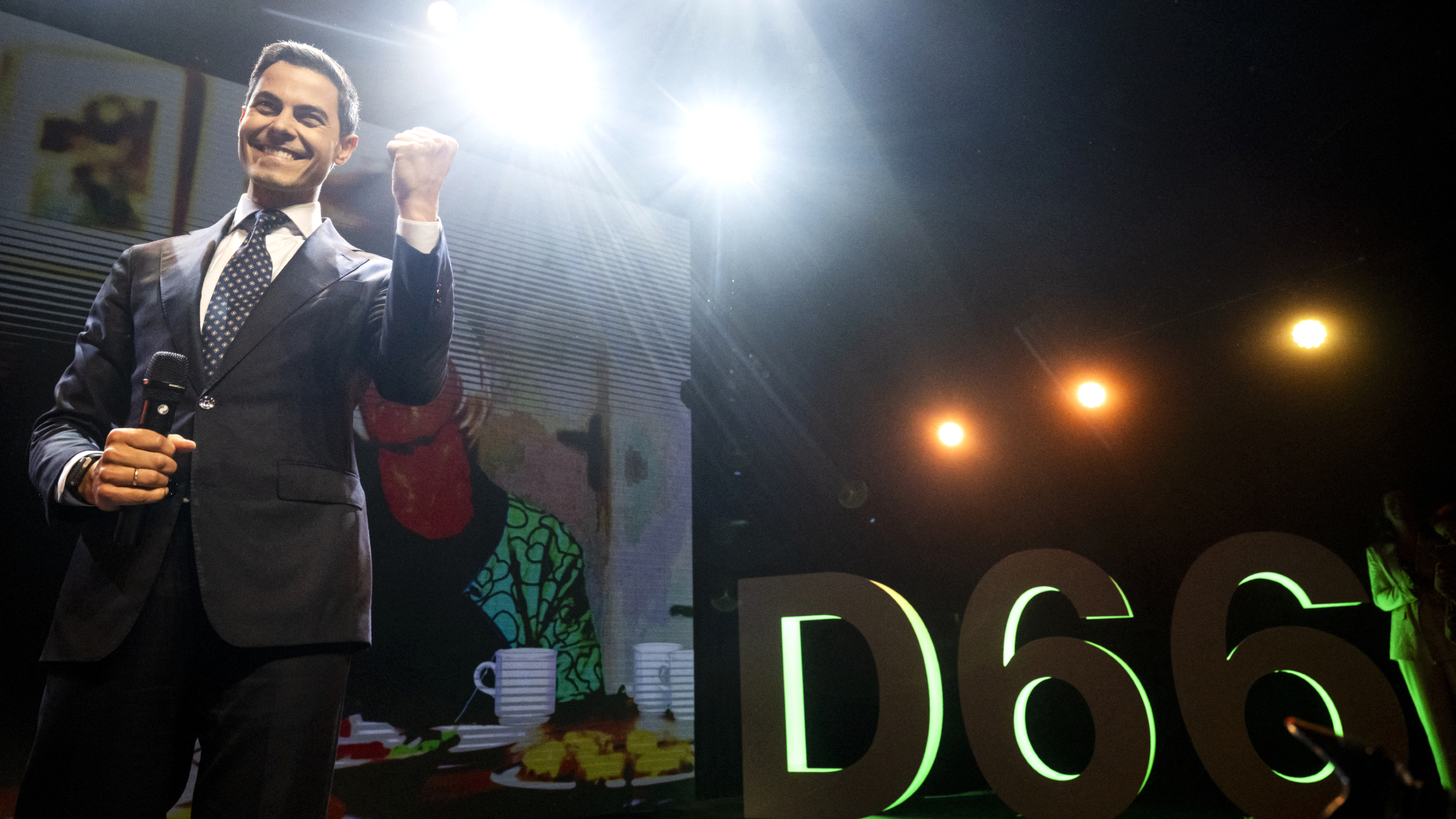The winners and losers of election night 2021
New York City night owls, police defunders, Trump, and more


A free daily email with the biggest news stories of the day – and the best features from TheWeek.com
You are now subscribed
Your newsletter sign-up was successful
Tuesday was a night of upsets, shoo-ins, nailbiters, and way too many cats. Here's our scorecard for the 2021 elections.
Winner: New York City night owls
The 110th mayor of New York City, Eric Adams, called it "almost silly" to suggest he shouldn't have spent the night partying in high-end nightclubs after his victory Tuesday evening. "This city does not go to sleep at 5 a.m.," Adams told NY1's Pat Kiernan on Wednesday morning, after soundly defeating his Republican opponent, avowed ailurophile Curtis Sliwa. "I'm going to be out visiting those hospital workers at 12 a.m. in the evening, I'm going to visit transit employees at 3, 4 a.m. in the morning."
Adams added that he was "happy to be at Zero Bond" — a private social club that counts Tom Brady and Kim Kardashian among its members — "then I went over to Cipriani's as well, and I'm going to continue to help my nightlife."
The Week
Escape your echo chamber. Get the facts behind the news, plus analysis from multiple perspectives.

Sign up for The Week's Free Newsletters
From our morning news briefing to a weekly Good News Newsletter, get the best of The Week delivered directly to your inbox.
From our morning news briefing to a weekly Good News Newsletter, get the best of The Week delivered directly to your inbox.
With Adams' election, New York City ends an era of criticizing its mayor over being chauffeured 12 miles to work out and begins one of criticizing its mayor over illegally parking and driving down the sidewalk.
Loser: Primary elections
When Buffalo's incumbent mayor, Byron Brown, lost his city's Democratic primary to socialist India Walton last June, Walton was expected to be all but a shoo-in on Election Day. But following "the most ambitious write-in campaign in recent memory," per Buffalo's WIVB, Brown appeared poised for victory come Wednesday morning.
A moderate Democrat seeking his fifth mayoral term, Brown was backed in his race by the New York State Republican Party, which sent thousands of mailers encouraging the write-in campaign. Meanwhile, Walton was "not uniformly embraced by state [Democratic] leadership, as Gov. Kathy Hochul — a Buffalo native — and Jay S. Jacobs, the chairman of the New York State Democratic Committee, declined to endorse her," The New York Times writes.
Loser: Police defunders
In one of the closest-watched elections of the night, voters in Minneapolis shot down a measure to replace the police department with a Department of Public Safety. "If residents of the heavily Democratic city where George Floyd was murdered by former police officer Derek Chauvin won't back a radical reimagination of law enforcement, who will? Almost nobody," writes Joel Mathis for The Week. Indeed, these days "almost two-thirds of Americans now believe crime is a 'very big problem'" and "places like Austin, Texas — where voters on Tuesday rejected a measure to increase the budget of the local police department — are the exception, not the rule."
A free daily email with the biggest news stories of the day – and the best features from TheWeek.com
The pattern could be seen elsewhere in the country as well. Adams, the new mayor of New York City, is a former police captain, while Kansas City elected as its mayor Tyrone Garner, the retired deputy chief of the Kansas City, Kansas Police Department. Likewise in Seattle, "a Republican leads [the] race for City Attorney — the other candidate is a self-described police abolitionist — and [the city] looks poised to elect a mayor (a Democrat) who favors more police over one who voted to cut police spending," points out Insider columnist Josh Barro.
Winner: Candidates of color
A whole lot of historic "firsts" were elected on Tuesday evening, including:
- Michelle Wu, a 31-year-old progressive, became the first woman and person of color to be elected as Boston's mayor.
- Aftab Pureval of Cincinnati, a Democrat, became his city's first Asian Pacific mayor.
- Ed Gainey of Pittsburgh, also a Democrat, became his city's first Black mayor.
- Alvin Bragg beat out seven other Democrats to be elected as Manhattan's first Black district attorney. His office is "conducting a high-profile investigation into former President Donald J. Trump and his family business," The New York Times notes.
- Winsome Sears, a Republican and immigrant from Jamaica, will be the first female lieutenant governor of Virginia as well as the first woman of color to be elected to statewide office in Virginia.
- Abdullah Hammoud, a Democrat whose family is from Lebanon, will become the first mayor of Arab descent to lead Dearborn, Michigan, a city that the Detroit Free Press says has been "long known for its sizable population with roots in the Middle East."
- Kansas City will have its first Black mayor, Tyrone Garner.
- Bruce Harrell is poised to become the first Asian-American mayor of Seattle — and only the city's second Black mayor.
Loser: The reconciliation bill?
Poor showings for Democrats in Virginia and New Jersey on Tuesday night could complicate passage of the reconciliation bill, which Democrats were "within striking distance" of finishing before the election, Politico writes. Now, though, there are "two possibilities: A) That the loss in Virginia will light a fire under Democrats, providing the urgency they needed to get Build Back Better over the finish line ... Or B) It triggers a whole new round of infighting, as progressives push to go bigger and moderates slimmer."
Though some predict Democrats will "circle the wagons" to push the legislation through, further quarreling between moderates and progressives could potentially complicate matters at a time when the party needs unity. "Democrats need to stop fighting each other and start delivering for voters," a Democratic strategist further told Politico. "If we don't, 2022 is going to be brutal."
Winner: Trump — but also not Trump
Speaking of Virginia, former President Donald Trump is already taking credit for Republican Glenn Youngkin's gubernatorial win there.
But "if we forget about Trump and the history of the last five years, Youngkin's victory looks completely ordinary," Ryan Cooper explains at The Week. CNN adds that Youngkin "focused on his own brand and on issues that were top of mind for local voters, instead of on a Trump-centric or Trump-style campaign that relied on rotating grievances and personal pique." Indeed, savvy to the fact that Trump lost Virginia to Joe Biden by about 10 points in 2020, Youngkin delicately avoided both campaigning with Trump and alienating Trump's base.
The result paid off in spades. As Politico reports, "Trump won rural Virginia 52-46 last year. Youngkin won it 64-36. Trump won non-college whites 62-38. Youngkin won those voters by a whopping 76-24. Youngkin's pivot to the center was successful, but his quiet fueling of the Trump base seemed to pay even bigger dividends."
Loser: The misinformation playbook
A campaign of misinformation is what led to Trump supporters violently storming the Capitol this past winter, encouraged by unfounded claims of fraud and conspiracy. But as this election night proved, and Mathis points out for The Week, Republicans don't need to lean on the misinformation playbook to win elections.
Youngkin particularly took pains to distance himself from Capitol rioters: "It is weird and wrong to pledge allegiance to a flag connected to Jan. 6," he said of an incident at an event where Trump called in to endorse Youngkin. "As I have said many times before, the violence that occurred on Jan. 6 was sickening and wrong," Youngkin added.
Meanwhile, in Montana, Great Falls Mayor Bob Kelly (D) easily won re-election. Kelly supports the creation of a national heritage area in central Montana; the proposal, however, was plagued by a misinformation campaign that falsely claimed the designation would hurt farmers and landowners. Fred Burow, Kelly's challenger, "opposed the proposal and trumpeted disinformation about it," The New York Times reports. Despite — or perhaps because of — that, he lost.
Jeva Lange was the executive editor at TheWeek.com. She formerly served as The Week's deputy editor and culture critic. She is also a contributor to Screen Slate, and her writing has appeared in The New York Daily News, The Awl, Vice, and Gothamist, among other publications. Jeva lives in New York City. Follow her on Twitter.
-
 Bad Bunny’s Super Bowl: A win for unity
Bad Bunny’s Super Bowl: A win for unityFeature The global superstar's halftime show was a celebration for everyone to enjoy
-
 Book reviews: ‘Bonfire of the Murdochs’ and ‘The Typewriter and the Guillotine’
Book reviews: ‘Bonfire of the Murdochs’ and ‘The Typewriter and the Guillotine’Feature New insights into the Murdoch family’s turmoil and a renowned journalist’s time in pre-World War II Paris
-
 Witkoff and Kushner tackle Ukraine, Iran in Geneva
Witkoff and Kushner tackle Ukraine, Iran in GenevaSpeed Read Steve Witkoff and Jared Kushner held negotiations aimed at securing a nuclear deal with Iran and an end to Russia’s war in Ukraine
-
 Kurt Olsen: Trump’s ‘Stop the Steal’ lawyer playing a major White House role
Kurt Olsen: Trump’s ‘Stop the Steal’ lawyer playing a major White House roleIn the Spotlight Olsen reportedly has access to significant US intelligence
-
 Japan’s Takaichi cements power with snap election win
Japan’s Takaichi cements power with snap election winSpeed Read President Donald Trump congratulated the conservative prime minister
-
 How realistic is the Democratic plan to retake the Senate this year?
How realistic is the Democratic plan to retake the Senate this year?TODAY’S BIG QUESTION Schumer is growing bullish on his party’s odds in November — is it typical partisan optimism, or something more?
-
 The billionaires’ wealth tax: a catastrophe for California?
The billionaires’ wealth tax: a catastrophe for California?Talking Point Peter Thiel and Larry Page preparing to change state residency
-
 Bari Weiss’ ‘60 Minutes’ scandal is about more than one report
Bari Weiss’ ‘60 Minutes’ scandal is about more than one reportIN THE SPOTLIGHT By blocking an approved segment on a controversial prison holding US deportees in El Salvador, the editor-in-chief of CBS News has become the main story
-
 Has Zohran Mamdani shown the Democrats how to win again?
Has Zohran Mamdani shown the Democrats how to win again?Today’s Big Question New York City mayoral election touted as victory for left-wing populists but moderate centrist wins elsewhere present more complex path for Democratic Party
-
 Dutch center-left rises in election as far-right falls
Dutch center-left rises in election as far-right fallsSpeed Read The country’s other parties have ruled against forming a coalition
-
 Millions turn out for anti-Trump ‘No Kings’ rallies
Millions turn out for anti-Trump ‘No Kings’ ralliesSpeed Read An estimated 7 million people participated, 2 million more than at the first ‘No Kings’ protest in June
